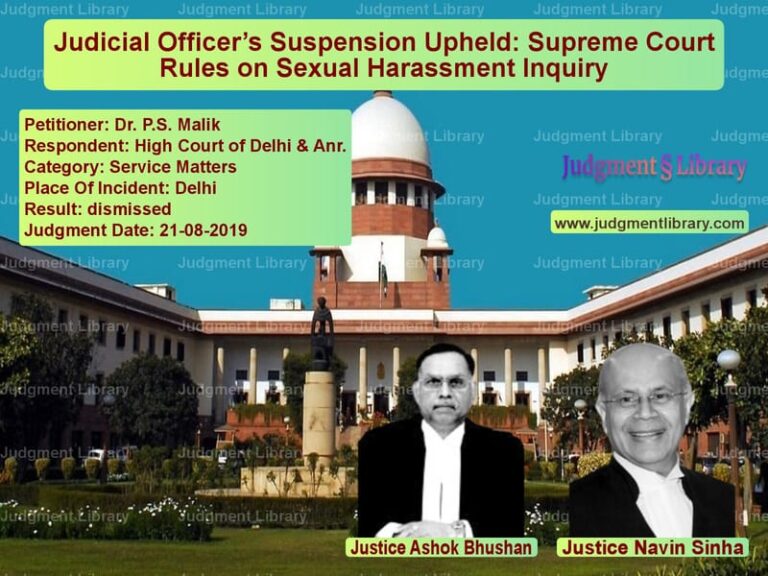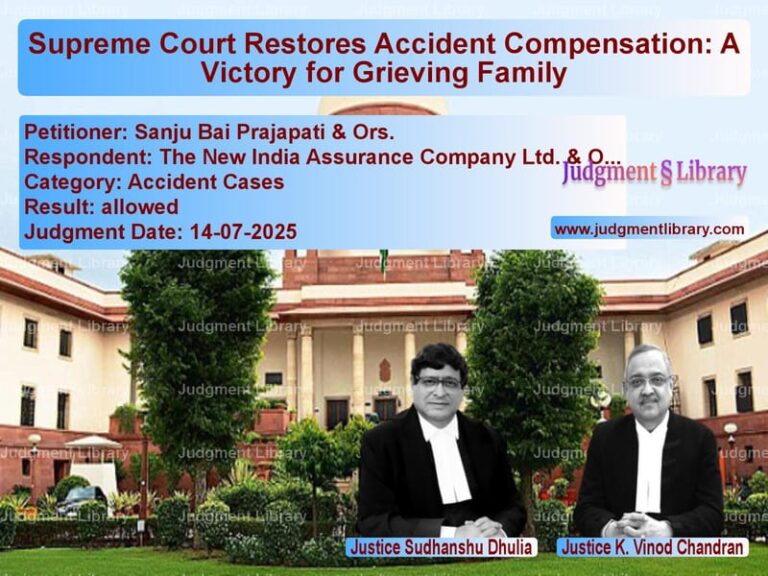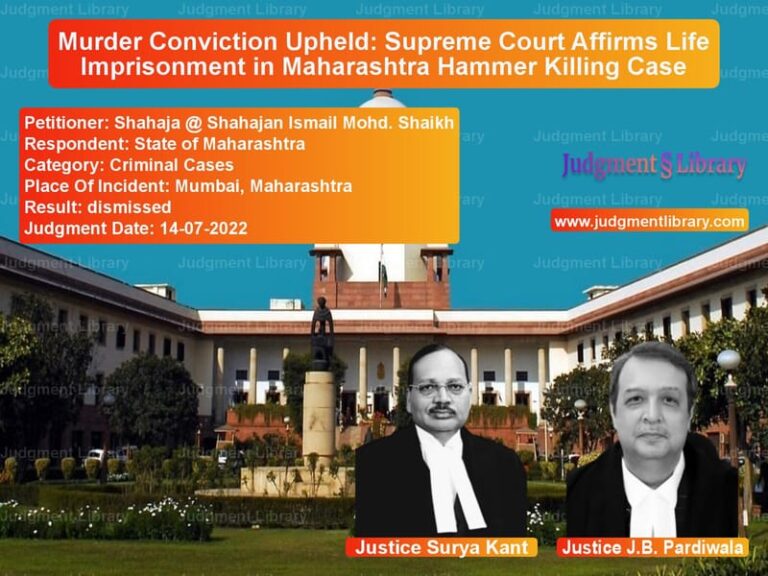Supreme Court Commutes Death Sentence in Jharkhand Kidnapping and Murder Case
The Supreme Court of India recently ruled on a significant criminal appeal in the case of Swapan Kumar Jha @ Sapan Kumar v. State of Jharkhand. The case involved the kidnapping and murder of a 19-year-old student, Sumit Kumar Ojha, in Jharkhand. The trial court had sentenced Swapan Kumar Jha to death, while the other two accused were awarded life imprisonment. However, after reviewing the circumstances of the case, the Supreme Court commuted the death sentence to life imprisonment, requiring the convict to serve at least 25 years without remission.
Background of the Case
On September 28, 2008, the victim, Sumit Kumar Ojha, left home after receiving a phone call but never returned. The next day, his father filed a missing person’s report at the Jharia Police Station. Soon after, the family received a ransom call demanding Rs. 20 lakhs for Sumit’s release. The police launched an investigation based on mobile call records and arrested the accused. The accused later confessed to the crime, leading to the discovery of the victim’s body in a graveyard in Giridih, Jharkhand.
Legal Proceedings
Trial Court’s Verdict
- The Sessions Court convicted all three accused under Sections 364-A, 302, and 201/34 of the IPC for kidnapping for ransom, murder, and disposal of evidence.
- The prime accused, Swapan Kumar Jha, was sentenced to death.
- The other two accused, Amarendra Kumar Sharma (Vicky) and Rocky Dutta, were sentenced to life imprisonment and fined Rs. 10,000 each.
- In case of non-payment of the fine, the convicts would undergo an additional six months of rigorous imprisonment.
High Court’s Confirmation
The High Court of Jharkhand upheld the conviction and sentence awarded by the trial court, including the death sentence of Swapan Kumar Jha.
Arguments in the Supreme Court
Appellant’s (Swapan Kumar Jha’s) Arguments
- The appellant’s counsel argued that his role was not the most brutal among the accused.
- He was young at the time of the offense and had the potential for rehabilitation.
- The appellant did not directly commit the murder; hence, the death penalty was excessive.
Respondent’s (State of Jharkhand’s) Arguments
- The prosecution contended that the crime was committed in a well-planned and premeditated manner.
- It involved betrayal of trust, as the victim was a close relative of the accused.
- The nature of the crime warranted the rarest of rare punishment, i.e., the death penalty.
Supreme Court’s Observations
The Supreme Court carefully considered the evidence, previous case law, and mitigating factors. The Court stated:
“The death penalty is to be imposed only when life imprisonment is totally inadequate and unquestionably foreclosed.”
The Court acknowledged that the crime was brutal and premeditated. However, it also recognized mitigating circumstances, including the young age of the accused and the possibility of reform.
Final Judgment
- The Supreme Court commuted the death sentence of Swapan Kumar Jha to life imprisonment with a minimum term of 25 years without remission.
- The life imprisonment of the other two accused was upheld.
- The Court observed that there was no appeal from the State seeking enhancement of their punishment.
- The decision was based on a careful balance of aggravating and mitigating factors.
Implications of the Judgment
- Reaffirmation of the Rarest of Rare Doctrine: The Court reinforced that the death penalty should only be imposed in cases of extreme brutality.
- Possibility of Rehabilitation: The ruling highlights that even in serious offenses, young offenders may be given an opportunity for reform.
- Judicial Precedent on Sentencing: The judgment sets a benchmark for cases involving kidnapping for ransom and murder.
Conclusion
The Supreme Court’s ruling in Swapan Kumar Jha v. State of Jharkhand reflects a balanced approach to sentencing in serious criminal cases. While upholding the gravity of the crime, the Court chose to commute the death sentence, ensuring that justice was served without resorting to capital punishment. This decision serves as a crucial precedent in India’s criminal jurisprudence, reinforcing the principle that the death penalty must be reserved for the most extreme cases.
Petitioner Name: Swapan Kumar Jha @ Sapan Kumar.Respondent Name: State of Jharkhand.Judgment By: Justice N.V. Ramana, Justice Mohan M. Shantanagoudar, Justice M.R. Shah.Place Of Incident: Jharkhand.Judgment Date: 15-11-2018.
Don’t miss out on the full details! Download the complete judgment in PDF format below and gain valuable insights instantly!
Download Judgment: Swapan Kumar Jha @ S vs State of Jharkhand Supreme Court of India Judgment Dated 15-11-2018.pdf
Direct Downlaod Judgment: Direct downlaod this Judgment
See all petitions in Murder Cases
See all petitions in Bail and Anticipatory Bail
See all petitions in Judgment by N.V. Ramana
See all petitions in Judgment by Mohan M. Shantanagoudar
See all petitions in Judgment by Mukeshkumar Rasikbhai Shah
See all petitions in partially allowed
See all petitions in Modified
See all petitions in supreme court of India judgments November 2018
See all petitions in 2018 judgments
See all posts in Criminal Cases Category
See all allowed petitions in Criminal Cases Category
See all Dismissed petitions in Criminal Cases Category
See all partially allowed petitions in Criminal Cases Category







